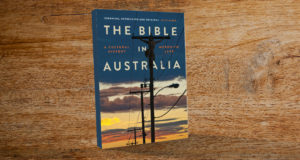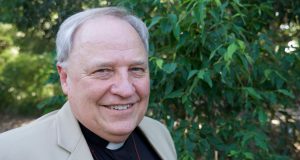Searching for Jehova
My name is George Harper and I am a reader of every issue of the Journey. I read it because I am interested in what individuals write about their interest in spiritual matters. I have never seen in any portion of Journey the name Jehovah, yet when I was a young boy we went to a Methodist Church and sang the song, “Thou Great and Wonderful Jehovah”. I do know that the name is in the Bible some 7000 times, and the greatest teacher in the world said about his apostles, “I have made your name known to them and will make it known so that the love with which you loved me may be in them and I in union with them.” (John 17:26)
So why is the name left out?
Dr Leigh Trevaskis, Trinity College Queensland principal and lecturer in Hebrew, offers this explanation:
Some people remember songs and Bible translations that refer to God as “Jehovah”. The name increasingly fell by the wayside when it was discovered that “Jehovah” derives from a misunderstanding of an ancient tradition for reading the Hebrew text.
How did this misunderstanding occur? The original Hebrew text contains consonants only. The consonants spelling Israel’s God’s name are JHVH. Vowels were added to the text much later.
But since Israel avoided pronouncing the sacred name, they overlaid it with the vowels from the Hebrew term for Lord (e.g. to simplify: Edonah), as a cue to read “Lord” rather than the actual name of God.
This tradition of reading produced a hybrid text, mixing the consonants of God’s name (JHVH) and the vowels of Lord (EOA).
Unaware of this tradition, the church assumed that the resultant hybrid form JeHoVah was Israel’s name of God: Jehovah.
Nowadays, translations prefer to render this hybrid with Lord or (in academic circles) Y(J)ahweh.
Thoughts on Alex Park
Regarding the article about Synod contemplating the sale of Alexandra Park Conference Centre (December 2016 edition), I believe this would be a very foolish move. Money, either small or large soon disappears, but property such as this centre improves greatly. Because it is in bussing distance of schools in Brisbane, it is in constant use for school camps, and returns a regular monetary income.
It has been a regular meeting place for Queensland Synod. It is the last of 11 camps, once owned by the church, which has not been sold, and may be developed for worthwhile community service and ideal for a community church.
Rev Jack Frewan-Lord
Mooloolaba
To contemplate the selling of such a valuable asset in what is affectionately known as the “Golden Triangle” by local residents seems quite ludicrous to anyone who has seen the development of the Sunshine Coast and especially the coastal fringe since the early 1980s.
The Uniting Church acquired the present 10 hectares after a property settlement with the Presbyterian Church following Union and the present facility is conducted and managed with a substantial profit to Synod funds. There is no doubt that a development plan with a missionary vision is needed to match the population growth and needs of the community, with the Maroochydore CBD moving into the precinct. Health and Educational development sees growth at an international level as well as the tourist potential for beach recreation the best in the world.
We believe there is still a place for God amongst the busyness of this developing region and we plead that the Synod Committee will “realise” the potential of Alex Park by keeping and using the site with sensitivity to its beauty and sharing it with others who will benefit from short and long stays finding “Him” through understanding, connection and restoration in a rapacious world.
Peter Asimus
Buderim
 JourneyOnline
JourneyOnline





